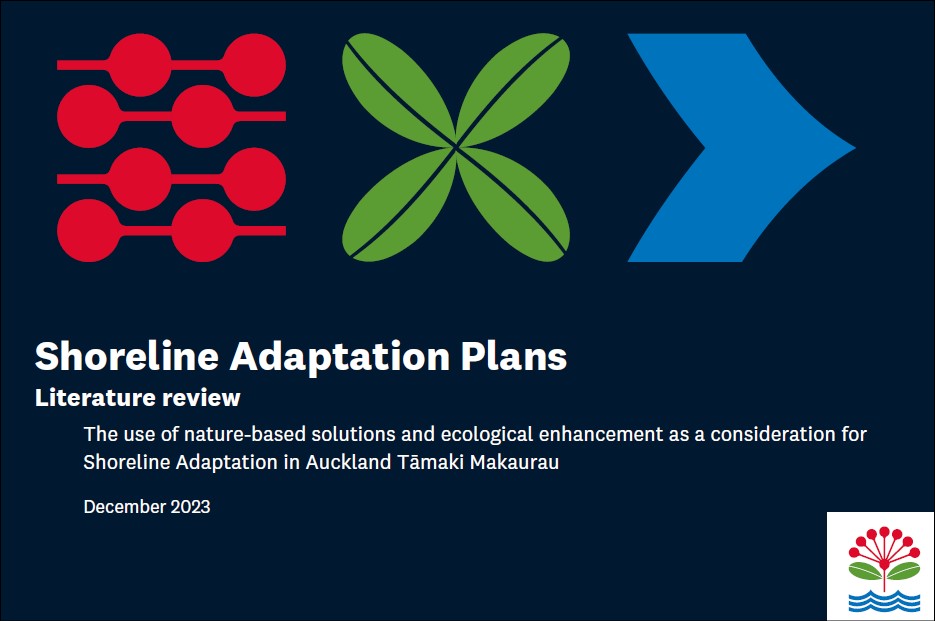Shoreline adaptation plans: literature review
Author:
Auckland Council, Tonkin + TaylorSource:
Auckland Council, Resilient Land and CoastsPublication date:
2023Topics:
EnvironmentShoreline Adaptation Plans: Literature review. The use of nature-based solutions and ecological enhancement as a consideration for Shoreline Adaptation in Auckland Tāmaki Makaurau.
Executive summary
Coastal environments around the world are under pressure from climate change. The pressures can vary from localised flooding, erosion, changes in habitats and species distribution, to the loss of coastal land to the sea. Responses often include the assessment of risk along stretches of coastline, the development of strategies or management options and plans to determine future actions.
Across the world and in New Zealand, these plans generally contain options that range from no intervention; preparing, planning or living with climate change; defending against specific coastal hazard effects from climate change with hard structures; and re-naturalisation of the coast and managed retreat inland. Impacts to the coastal environment from climate change can be supported by nature-based solutions and ecological enhancements for protection and to limit the impacts.
Climate change impact predictions presented within the Pearce et al., 2020 report and the Auckland Council Climate Change Risk Assessment series (Section 2.0) can help assist in understanding of climate change pressures on the coastline in Auckland, New Zealand, and aid in decision-making and selection of nature-based solutions for shoreline management.
To understand the optimum adaptive strategy, information about climate change stressors, the assets that need to be protected and the current ecology and ecosystems present is required and should be a first step in the development of each of the 20 Shoreline Adaptation Plan for Auckland’s coastal environment. These plans look at how council-owned assets and land can be managed in response to coastal hazards and climate change over the next 100 years.
A general theme across the national and international management plans reviewed, is that a naturalised approach is often the preferred option, however, this may not always be feasible due to asset protection, urgency, environmental suitability, consent conditions and cost. However, in many cases, a mix of nature-based solutions and hard structures are the preferred option with longer-term strategic planning having the ability to overcome the barriers of coastal protection and manage the shoreline in a more adaptable way.
The opportunity to utilise nature-based solutions for the protection of shorelines from climate change are progressively being adopted in favour of hard structure coastal protection, which can cause displacement of impacts further around the coastline, potentially requiring ongoing maintenance.
A benefit of nature-based solutions is the ability to future proof the coastline from impacts of climate change processes while providing multiple benefits, including social and economic. Case studies from around the world and New Zealand point towards the provision of ecosystem services such as storm management, water filtration, maintaining and enhancing coastal habitats, protection of existing assets and infrastructure as an outcome of nature-based solutions.
Economic benefits from coastal protection through the use of nature-based solutions, reduces the impacts from storms and coastal erosion, through the reduction of impacts to infrastructure. Further economic gains could be made from ecological benefits that come with the provision of healthy ecosystems, including a potential increase in recreational and commercial fishing opportunities as a result of increased fish stocks from the provision of protective habitat, such as kelp forests and salt marsh for juveniles.
By implementing nature-based solutions and ecological enhancements, the positive outcomes can include accommodation for climate change effects, biodiversity conservation, helping to preserve the habitats and species of the local area, increased ecosystem services, and the connectedness with the region for years to come.
To ensure that a nature-based strategy is providing the intended function, monitoring is critical to the success of the work, allowing for intervention if required. Further, State of the Environment monitoring of local water quality and estuarine health, is one current mechanism to understand the current impacts on the coastline from climate change and ecosystem services provided by nature-based solutions.
This literature review supports the Auckland Council Shoreline Adaptation Plan Programme and provides information for community discussions; to inform spatial analysis for coastal management options, opportunities and constraints in a localised context. There are many resources that the review identifies, and these too, are valuable for discussions to inform Auckland Council’s decision- making for coastal management of council-owned assets and land.
Auckland Council, December 2023
See also
Auckland Council website
